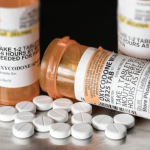(Reuters)—Five opioid manufacturers, including OxyContin maker Purdue Pharma LP, have paid more than $10 million to advocacy groups and doctors tied to them, many of whom amplified industry messages supporting the use of the painkillers, a U.S. Senate report said on Monday.1
The report, released by Sen. Claire McCaskill (D-Mo.), says groups who received the donations aligned themselves with industry goals and may have played a role in an epidemic that in 2016 led to 42,000 opioid overdose deaths.
The report released by Sen. McCaskill, the U.S. Senate Homeland Security and Governmental Affairs Committee’s ranking democrat, said the groups issued guidance promoting opioids for chronic pain and lobbied against laws to curb their use.
“These financial relationships were insidious, lacked transparency, and are one of many factors that have resulted in arguably the most deadly drug epidemic in American history,” Sen. McCaskil said in a statement.2
Purdue Pharma, which on Saturday announced it would stop promoting opioids to doctors, was the biggest donor, giving $4.15 million to 12 groups from 2012 to 2017, the report said.
The groups include patient advocacy organizations and medical professional societies.
One recipient was the Academy of Integrative Pain Management (AIPM), which partnered with another group to lobby state legislatures on opioid-related issues and fight efforts to restrict opioid prescribing, the report said.
Purdue said in a statement that it supported organizations interested in helping patients receive appropriate care. AIPM Executive Director Bob Twillman said that financial contributions had not influenced its positions.
The report said Insys Therapeutics Inc., which markets the fentanyl-based cancer pain drug Subsys, gave $3.15 million to U.S. Pain Foundation and others, ranking No. 2 in donations to the 14 groups examined.
Federal prosecutors have accused several former Insys executives and employees, including billionaire Insys founder John Kapoor, of engaging in a scheme to pay kickbacks to doctors to prescribe Subsys. Kapoor has pleaded not guilty.
U.S. Pain Foundation said the $2.5 million Insys donated in 2017 was for a fund to help cancer patients pay for pain drugs, and that the money did not influence its values. Insys said it strives to follow regulations.
The report said the groups also received $1.07 million from Depomed Inc., $465,142 from Johnson & Johnson and $20,250 from Mylan NV.
Doctors affiliated with the organizations received $1.6 million, the report said.
Depomed said its contributions amounted to on average just about $20,000 a year for nine groups and said it believed it acted responsibly in marketing its drugs. J&J said it co-operated with Sen. McCaskill. Mylan emphasized its small opioid marketshare.

